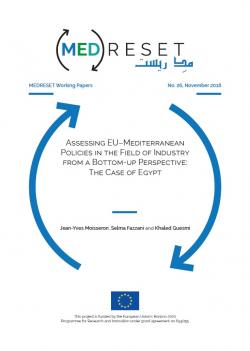Assessing EU–Mediterranean Policies in the Field of Industry from a Bottom-up Perspective: The Case of Egypt
The present report analyses the situation of the Egyptian industry sector within the framework of the EU-funded project MEDRESET and investigates Euro-Mediterranean industry policy in Egypt. The report assesses the EU’s involvement in industry-related programmes in light of Egyptians’ welfare and with a view to responding to MEDRESET’s set of questions. To this end, we conducted our research reaching out to a large set of stakeholders, including some who are not regarded as traditional partners of international organizations (i.e., informal contacts, media, etc.). We used this approach to circumvent fieldwork limitations imposed by Egypt’s current political situation. These limitations include the absence of local critical studies on the country’s industrial policy and on EU policies indirectly pertaining to the industrial sector through the Free Trade Agreement, as well as the inability to carry out the project’s recursive multi-stakeholder consultations with representatives of local civil society actors, as planned in the MEDRESET project. These pitfalls also resulted in our inability to wholly reflect on the gender dimension of the industrial policy, despite the significant presence of female workers in the textile sector. Regarding the main findings of this report, the EU policies after the Association Agreement appear to have shifted from a light concern on industry to trade reform. Given the focus on “aid for trade”, the scope and the impact of the EU programmes on Egyptian industry are difficult to assess, as they appear to marginally influence the economy and the sector. Moreover, the EU policy related to trade orientation comes in contradiction to the population needs, as trade liberalization tends to favour the EU over Egypt. The structure of both trade and foreign direct investment has a low impact on Egypt’s employment.
-
Details
Rome, IAI, November 2018, 44 p. -
In:
-
Issue
Working Paper 26
1. Methodology
2. General Background Analysis on the Industry Sector in Egypt
2.1 Context Information: An Overview of Egyptian Industry
2.2 The Egyptian Industry: Different Stages (1956–2017)
2.3 Policies Related to Industry under Sisi
2.3.1 An Assessment by Sector
2.3.2 The Industry and Trade Development Strategy (2016–20)
2.3.3 Vision 2030
3. An Assessment of European Policies
3.1 EU–Egypt Trade Relations
3.2 The EU’s Main Policy Instruments: The Association Agreement (2004) and the Action Plan (2007)
3.3 EU Programmes Related to Industry in Egypt (2002–2017)
3.4 Industry Out of the Viewfinder?
3.5 EU Support to Egypt’s Trade and Industry Strategy
3.6 Deep and Comprehensive Free Trade Area (DCFTA)
3.7 Social and Economic Effects of the EU Policies in Egypt
References



